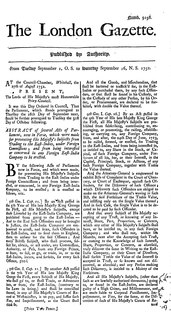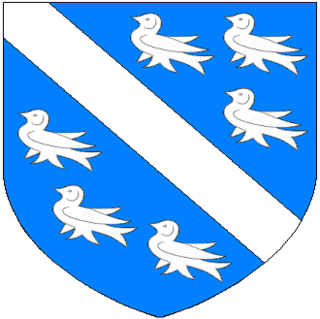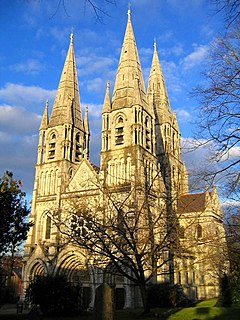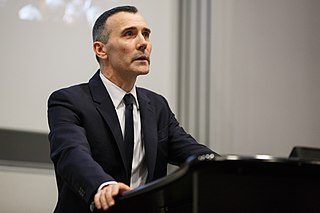| |||||
| Centuries: | |||||
|---|---|---|---|---|---|
| Decades: | |||||
| See also: | Other events of 1215 List of years in Ireland | ||||
Events from the year 1215 in Ireland.
| |||||
| Centuries: | |||||
|---|---|---|---|---|---|
| Decades: | |||||
| See also: | Other events of 1215 List of years in Ireland | ||||
Events from the year 1215 in Ireland.

Laurence Sterne, an Anglo-Irish novelist and Anglican cleric, wrote the novels The Life and Opinions of Tristram Shandy, Gentleman and A Sentimental Journey Through France and Italy, published sermons and memoirs, and indulged in local politics. He grew up in a military family travelling mainly in Ireland but briefly in England. An uncle paid for Sterne to attend Hipperholme Grammar School in the West Riding of Yorkshire, as Sterne's father was ordered to Jamaica, where he died of malaria some years later. He attended Jesus College, Cambridge on a sizarship, gaining bachelor's and master's degrees. While Vicar of Sutton-on-the-Forest, Yorkshire, he married Elizabeth Lumley in 1741. His ecclesiastical satire A Political Romance infuriated the church and was burnt. With his new talent for writing, he published early volumes of his best-known novel, The Life and Opinions of Tristram Shandy, Gentleman. Sterne travelled to France to find relief from persistent tuberculosis, documenting his travels in A Sentimental Journey Through France and Italy, published weeks before his death. His posthumous Journal to Eliza addresses Eliza Draper, for whom he had romantic feelings. Sterne died in 1768 and was buried in the yard of St George's, Hanover Square. His body was said to have been stolen after burial and sold to anatomists at Cambridge University, but recognised and reinterred. His ostensible skull was found in the churchyard and transferred to Coxwold in 1969 by the Laurence Sterne Trust.

Richard III was King of England and Lord of Ireland from 26 June 1483 until his death in 1485. He was the last king of the House of York and the last of the Plantagenet dynasty. His defeat and death at the Battle of Bosworth Field, the last decisive battle of the Wars of the Roses, marked the end of the Middle Ages in England. He is the protagonist of Richard III, one of William Shakespeare's history plays.

The United Kingdom of Great Britain and Northern Ireland, commonly known as the United Kingdom (UK) or Britain, is a sovereign country in north-western Europe, off the north-western coast of the European mainland. The United Kingdom includes the island of Great Britain, the north-eastern part of the island of Ireland, and many smaller islands within the British Isles. Northern Ireland shares a land border with the Republic of Ireland. Otherwise, the United Kingdom is surrounded by the Atlantic Ocean, with the North Sea to the east, the English Channel to the south and the Celtic Sea to the south-west, giving it the 12th-longest coastline in the world. The Irish Sea separates Great Britain and Ireland. The total area of the United Kingdom is 242,500 square kilometres (93,628 sq mi), with an estimated population in 2020 of 68 million.

Cambridge University Library is the main research library of the University of Cambridge. It is the largest of the over 100 libraries within the University. The Library is a major scholarly resource for the members of the University of Cambridge and external researchers. It is often referred to within the University as the UL. Thirty three faculty and departmental libraries are associated with the University Library for the purpose of central governance and administration, forming "Cambridge University Libraries".

Duke of Cambridge, one of the eight current royal dukedoms in the United Kingdom as of 2021, is a hereditary title of specific rank of nobility in the British royal family. The title is heritable by male descendants by primogeniture, and has been conferred upon members of the British royal family several times. The wife of the titleholder bears the title Duchess of Cambridge.
The Acts of Supremacy are two acts passed by the Parliament of England in the 16th century that established the English monarchs as the head of the Church of England. The 1534 Act declared King Henry VIII and his successors as the Supreme Head of the Church, replacing the pope. This first Act was repealed during the reign of the Catholic Queen Mary I. The 1558 Act declared Queen Elizabeth I and her successors the Supreme Governor of the Church, a title that the British monarch still holds.

Robert Stewart, Duke of Albany was a member of the Scottish royal family who served as regent to three Scottish monarchs. A ruthless politician, Albany was widely regarded as having caused the murder of his nephew, the Duke of Rothesay, and brother to the future King James I of Scotland. James was held in captivity in England for eighteen years, during which time Albany served as regent in Scotland, king in all but name. He died in 1420 and was succeeded by his son, Murdoch Stewart, Duke of Albany, who was executed for treason when James returned to Scotland in 1425, almost causing the complete ruin of the Albany Stewarts.

Cratloe is a village in County Clare, Ireland, situated between Limerick and Shannon in the mid-west of Ireland. It is possible that the name derives from Croit-shliabh meaning "hump-backed hill", referring to Woodcock Hill. The present-day parish of Cratloe consists of the former parish of Kilfintinan and a portion of the contemporary parish of Killeely. This was agreed upon by priests in the 18th century, who claimed there were not enough members of the clergy to operate fully in both parishes.

Old Style (O.S.) and New Style (N.S.) indicate a dating system from before and after a calendar change, respectively. Usually this is the change from the Julian calendar to the Gregorian calendar as enacted in various European countries between 1582 and the 20th century.

William Ros, 6th Baron Ros was a medieval English nobleman, politician and soldier. The second son of Thomas Ros, 4th Baron Ros and Beatrice Stafford, William inherited his father's barony and estates in 1394. He married Margaret, daughter of Baron Fitzalan, shortly afterwards. The Fitzalan family, like that of Ros, was well-connected at the local and national level. They were implacably opposed to King Richard II, and this may have soured Richard's opinion of the young Ros.

Sir Geoffrey de Luterel I, was a courtier and confidant of King John, whom he served as a minister.
Events from the year 1800 in Great Britain.
The Bishop of Cloyne is an episcopal title that takes its name after the small town of Cloyne in County Cork, Republic of Ireland. In the Roman Catholic Church, it is a separate title; but, in the Church of Ireland, it has been united with other bishoprics.

The Diocese of Cork, Cloyne and Ross, also referred to as the United Diocese of Cork, Cloyne and Ross is a diocese in the Church of Ireland. The diocese is in the ecclesiastical province of Dublin. It is the see of the Bishop of Cork, Cloyne and Ross, the result of a combination of bishoprics of Cork and Cloyne in 1429, Cork and Cloyne and Ross in 1583, the separation of Cork and Ross and Cloyne in 1660 and the re-combination of Cork and Ross and Cloyne in 1835.
The High Sheriff of Clare was a High Sheriff title. Records show that the title was in existence from at least the late 16th century, though it is not used today in the modern Republic of Ireland. The title existed within County Clare in the west of Ireland during the time of the Kingdom of Ireland and then as part of the United Kingdom of Great Britain and Ireland.
Cratloe Woods is a forested area around the village of Cratloe in County Clare, Ireland. Much of the original oak forest has been replaced with coniferous softwoods during the past century; however, small pockets of native oak survive. The largest such pocket is the Garranon Wood, which is visible on the hillside just north of the N18 road from Limerick to Shannon.
Cratloe GAA is a Gaelic Athletic Association club located in the village of Cratloe, County Clare, Ireland. The club deals with both Gaelic football and hurling and basketball. The club competes in Clare GAA competitions. In November 2013, Cratloe won their first ever Clare Senior Football Championship title, defeating Doonbeg by 0-10 to 0-7. They reached the 2013 Munster Senior Club Football Championship final on 1 December, but were defeated 0-13 to 0-12 by Dr Crokes.
Events from the year 1960 in Scotland.

Richard Bourke is a UK-based Irish academic specialising in the history of political ideas. His work spans ancient and modern thought, and is associated with the application of the historical method to political theory. He is Professor of the History of Political Thought at the University of Cambridge, and a Fellow of King's College, Cambridge. He was formerly Professor of the History of Political Thought and Co-Director of the Centre for the Study of the History of Political Thought at Queen Mary, University of London. In July 2018 Bourke was elected Fellow of the British Academy (FBA).
Niall Deasy is an Irish hurler who plays as a left wing-forward for club side Ballyea and at inter-county level with the Clare senior hurling team.